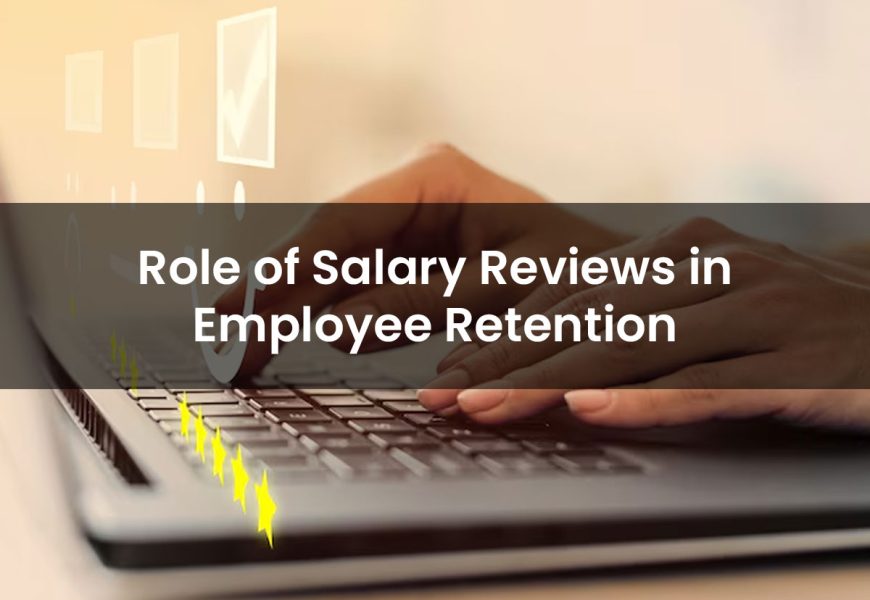Salary is one of the most important aspects of any job. Some would even agree and call it the most important aspect. A good salary will satisfy you, make you want to perform better at work and bring a general sense of fulfilment.
The current economic climate certainly doesn’t make the jobs of leaders and managers any easier. They must balance keeping their top performers motivated, engaged, and satisfied while adhering to established compensation budgets.
According to a 2023 Income Data Research study, two-thirds of UK employers are predicting lower median pay raises in 2024 compared to 2023.
This makes it more important than ever for companies to use effective compensation processes to maximise the financial resources available. The optimal approach is to implement and maintain a consistent compensation strategy that enables decision-makers to determine which team members receive salary increases.
At the core of this strategy are salary reviews.
The salary review process can seem daunting, which is why this article aims to help. We will cover what salary reviews are, why they are essential, and their impact on company culture. Additionally, we provide a step-by-step guide on how to implement a salary review successfully.
What is a Salary Review?
The concept of a salary review is straightforward. It involves evaluating an employee’s compensation at specific intervals during their tenure with the company to ensure that the pay package is fair and aligned with various factors such as experience, market trends, company culture, and job performance.
This formal process involves HR, management, and the employee. Typically, one or more of these stakeholders will meet to discuss milestones, achievements, future job strategy, the overall market situation, and other relevant issues. These discussions help determine whether the employee is fairly compensated or under-compensated. The outcome of a salary review meeting can significantly impact an employee’s career trajectory.
Are Salary Reviews Important?
Salary reviews are directly proportional to the growth of the company as well as the growth of the working professional. Money is the biggest motivation for anyone to work better and more effeciently. The important of salary reviews cannot be emphasis enough. If implemented well, it can have multiple benefits. Here is all what you can expect:
- Better Retention Rates: Recent research indicates that 47% of employees who have left or are planning to leave their jobs did so for higher salaries. Conducting salary reviews helps identify potential flight risks and can guide decisions regarding retention bonuses, thereby reducing attrition.
- Defined Time for Raises: Uncertainty can be detrimental to employee morale. Regular salary reviews provide employees with a clear understanding of the compensation review process, allowing them to know when to expect potential raises. This assurance demonstrates that the company values employee salaries.
- Enhanced Communication: Studies reveal that many employees are unaware of how their pay compares to the job market. In fact, 57% of individuals paid at market rate believed they were underpaid. Salary reviews allow managers to explain the company’s compensation strategy, addressing misunderstandings and involving employees in pay discussions.
- Less Friction Between Leadership and Team Members: Salary reviews signal to employees that their organization values and invests in them. These reviews encourage managers to proactively address job performance and compensation issues before they escalate to dissatisfaction, disengagement, or turnover.
- Helps You Identify Talent Gaps: Salary reviews offer managers the chance to discuss team members’ current positions and the skills they should focus on to advance their careers. These conversations can also inform promotion decisions as part of your promotion policy.
- Increased Motivation: Fair compensation is essential for employee engagement and productivity. Salary reviews support this by ensuring employees feel valued. If there is dissatisfaction with your current compensation planning approach, incorporating salary reviews into your employee engagement strategy can be beneficial.
Salary Reviews and Company Culture
Compensation management significantly influences company culture, with salary reviews being a crucial component. Effective salary reviews foster frank discussions about pay and performance, promoting greater honesty and openness between employees and leaders.
Additionally, salary reviews serve as a powerful motivational tool. Managers can use these reviews to discuss how employees achieved an increase in their fixed pay or received incentive compensation, and what improvements are needed to reach such milestones. When team members understand the steps to achieve desired outcomes, their productivity increases.
Key Business Stakeholder and the Salary Review Cycle
Salary reviews typically involve multiple business stakeholders, including the employee’s direct supervisor, HR, and sometimes project managers who have collaborated with the employee or team in recent quarters. It is beneficial for these stakeholders to establish a clear strategy for adjusting salaries and benefits as the business evolves, adding significant value to the process.
- Direct conversations between the decision-maker and the employee are crucial for maintaining transparency and fairness throughout the process.
- The business environment is dynamic, with market conditions often influenced by external factors. While these factors may impact salary reviews, stakeholders should consistently define clear goals and set expectations for employees undergoing review.
- Engaging employees in the salary review process is essential. Stakeholders should solicit feedback from staff members before and after the review to understand their perspectives, opinions, and satisfaction levels.
- Especially for industries like IT where job mobility is high, it is crucial for businesses to continuously monitor competitor salaries to ensure their compensation packages remain competitive.
- The salary review process should reflect the company’s core values, objectives, and budget constraints, ensuring it supports the organization’s overall mission.
- Salary decisions should be based on well-defined KPIs and performance indicators to maintain objectivity and eliminate personal biases.
- Employees, especially long-standing ones, should have a clear understanding of what to expect during salary reviews. Avoiding improvised reviews prevents confusion and suspicion.
- An employee’s total compensation includes more than just their monthly salary. Pension contributions, performance bonuses, ex gratia payments, and other financial incentives are integral parts of the overall package.
Implementing a Great Salary Review
Implementing an effective salary review process requires a well-defined plan that integrates seamlessly with your overall compensation management strategy, ensuring consistency across the board. Every company is unique, so consider these steps as a general guideline:
Job Market Research
Start by thoroughly researching the external job market. Collect data on your competitors and other companies within your industry to get a comprehensive understanding. Focus on:
- Salary ranges and individual compensation
- Job titles and descriptions
- Additional benefits
- Overall compensation packages
- Other factors influencing pay, such as work hours, schedules, and remote work options
It’s important not to simply replicate your competitors’ salaries. Take into account differences that might affect their compensation packages. For example, even if a competitor has similar positions, do their job descriptions align with yours, or do they entail more responsibilities? Also, consider the geographical location of their employees. Use the insights gathered to determine appropriate compensation levels for your organization.
Clarify Your Objectives
The next step is to discuss both company-wide and individual objectives to clarify what you’re aiming to achieve. Clearly defining these objectives helps set expectations for the salary review process. Consider using a tool like Leapsome Goals to facilitate this process.
Additionally, collaborate with your accounting department to gain a clear understanding of your company’s budget. Keep in mind that your budget may influence some of your objectives. Calculate the total amount available for salary increases for the year to ensure alignment with your financial resources.
Internal Impact
Using your market data and objectives as a benchmark, develop a salary structure by determining a salary band for each position. Consider the impact of each role within your company and the difficulty of filling a similar position if it becomes vacant. Remember, each business is unique, and a supporting role in your company could be a key position for your competitor.
Ensure that both management and HR understand why each position was assigned its specific pay band during this phase of the salary review process.
For instance, is the salary higher due to the high demand of the role or because it includes managerial responsibilities? With this information, the leadership can explain the rationale behind salaries to employees better, who will appreciate the increased transparency and feel more secure with the additional insights.
Evaluate Every Employee’s Pay
Determine the factors on which to base your team members’ salaries and decide what each of them should be paid. Consider elements such as:
- Job title
- Job requirements and experience
- Qualifications
- Employee performance
- Potential for growth
Ensure your approach to employee assessment includes a comprehensive feedback culture. This should encompass 360° performance reviews, one-on-one meetings, and continuous feedback, among other essential people enablement processes.
Let Them Know
Now it’s time to communicate the results of the salary reviews to your employees and provide feedback. You should be prepared to inform each employee about:
- Whether there has been a salary increase
- The amount of the increase, if applicable
- The reason for the increase or the reason for no increase
- How their salary compares to the market percentile your company is targeting
- When the increase will take effect
- When the next salary review is scheduled
- What they need to do to achieve a salary increase, if they haven’t received one
Ensuring that team members understand the reasoning behind their salary adjustments is crucial for maintaining fair compensation practices. Employees will appreciate your transparency, which in turn fosters engagement and advocacy.
Process Review
The final step is to gather feedback on your salary review process. Ask employees if their salary increases met their expectations and if they understood the reasoning behind any decisions made. Use quick pulse surveys to collect this feedback, ensuring anonymity to encourage honest responses.
After completing each annual salary review, revisit the process with the collected feedback in mind. Make it a habit to continuously research job market data and set new goals to keep your compensation strategy effective and up-to-date.
FAQs about Salary Reviews
What is the role of compensation in employee retention?
Compensation plays a crucial role in employee retention by serving as a significant factor in attracting and retaining top talent. Competitive compensation packages that include salaries, bonuses, benefits, and other perks not only attract skilled professionals but also incentivize them to stay with the company. Fair and competitive compensation demonstrates the organization's appreciation for employees' contributions, fosters loyalty, and reduces the likelihood of turnover.
What is the role of performance management in employee retention?
Performance management contributes to employee retention by providing regular feedback, setting clear expectations, and fostering professional development. Effective performance management processes help employees understand their roles and responsibilities, receive recognition for their achievements, and identify areas for improvement. By aligning individual goals with organizational objectives, performance management enhances employee engagement, job satisfaction, and ultimately, retention.
What is retention pay in salary?
Retention pay, also known as retention bonuses or retention incentives, refers to additional compensation offered to employees to encourage them to remain with the company for a specified period. These bonuses are typically awarded to key employees or those with critical skills or expertise whose departure could negatively impact the organization. Retention pay serves as a proactive measure to retain valuable talent and mitigate the risks associated with turnover.
Click Here For Also Know About No Objection Certificate Format















